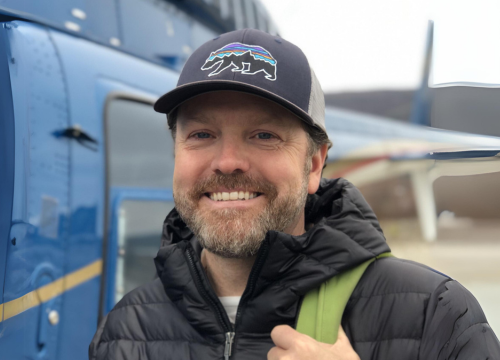Alum Nicholas Scapillati Builds Connection to Conservation Movement Through Master of Conservation Leadership

When Nicholas Scapillati began the Master of Conservation Leadership (MCL), he hoped to elevate his credentials and stay competitive in conservation. However, upon graduation, Nicholas found that he walked away with much more, feeling more connected to his colleagues in the conservation community and gaining a deeper understanding of conservation and its relationship with colonization.
Upon finishing his undergrad in the mid-90s, Nicholas wanted a master's degree. Still, he didn't see any programs that applied to what he wanted to do–conservation. He got his first job working directly with David Suzuki doing research for the book The Sacred Balance, which led to a job at the David Suzuki Foundation and, ultimately, an engaging career in food sustainability and ecological restoration.
After serving for five years as Executive Director of the Grizzly Bear Foundation, a charitable organization dedicated to the conservation and welfare of the grizzly bear, Nicholas heard about the MCL program from a former colleague and faculty member in the program, Dr. Faisal Moola. Nicholas was thrilled to find a master's program that captured his interest in conservation leadership. He joined the program in 2020 to be part of the inaugural MCL class.
Reflecting on the MCL program's impact on his skills and career, Nicholas said, "Even though I've been working closely with Indigenous communities for over 25 years, MCL helped me learn the language to speak to colonialism and reconciliation with sensitivity and confidence. I now have a deeper understanding of the history of conservation and the two-eyed seeing approach of working through both scientific and Indigenous knowledge systems.
Nicholas also found that this confidence and experience took his leadership to the next level. "The program elevated my leadership status with colleagues and made me a better leader. The Grizzly Bear Foundation has greatly benefited from this degree, as the leadership skills I have developed help me inspire my team to show leadership at the program level and within a particular moment, moving away from a traditional model and towards empowerment and collaboration."
But besides the practical skills and knowledge he gained through the program, Nicholas says MCL made him feel more connected to the conservation community. "We're all working separately for our organizations, but in the MCL program, I got to work with my fellow students who are my colleagues in the field. The problems we face are dire and challenging. Still, the fearlessness I get from doing the work and seeing that others around me are doing the same, the feeling of being a part of a bigger conservation community, is truly empowering."
The Master of Conservation Leadership program is a two-year course-based graduate program designed to prepare students for a senior leadership role in conservation. Learn more about the MCL program.